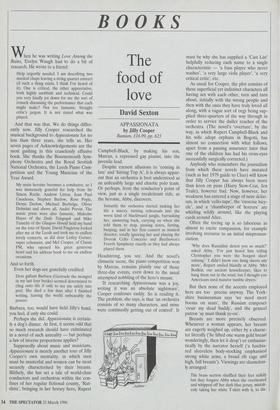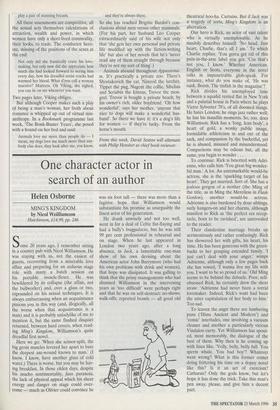BOOKS
The food of love
David Sexton
APPASSIONATA by Jilly Cooper Bantam, £16.99, pp. 623 hen he was writing Love Among the Ruins, Evelyn Waugh had to do a bit of research. He wrote to a friend:
Help urgently needed. I am describing two musical chaps leaving a string quartet concert (if such a thing exists, I think I've heard of it). One is critical, the other appreciative, both highly snobbish and technical. Could you very kindly jot down for me the sort of remark discussing the performance that each might make? Not too fantastic. Straight critic's jargon. It is not stated what was played.
And that was that. We do things differ- ently now. Jilly Cooper researched the musical background to Appassionata for no less than three years, she tells us. Her seven pages of Acknowledgements are the most gushing in this ceaselessly effusive book. She thanks the Bournemouth Sym- phony Orchestra and the Royal Scottish National Orchestra, the Leeds Piano Com- petition and the Young Musician of the Year Award.
My main heroine becomes a conductor, so I was immensely grateful for help from Sir Simon Rattle, Andrew Litton, Jean Paul Casadesus, Stephen Barlow, Ross Pople, Denys Darlow, Michael Burbidge, Oliver Dohnini and above all, Andre Previn. The music press were also fantastic, Malcolm Hayes of the Daily Telegraph and Mike Tumelty of the Glasgow Herald held my hand on the tour of Spain; David Fingleton looked after me at the Leeds and took me to endless lovely concerts, as did dear Lesley Garner, super columnist, and Mel Cooper, of Classic FM, who opened his great generous heart and his address book to me on endless occasions.
And so forth.
Even her dogs are gratefully credited.
Dear gallant Barbara (Gertrude the mongrel in my last four books) seemed determined to cling onto life if only to see me safely into port. She died a few days after I finished writing, leaving the world unbearably the poorer.
Barbara, too, would have held Jilly's hand, you feel, if only she could.
Perhaps she did. Appassionata is certain- ly a dog's dinner. At first, it seems odd that so much research should have culminated in a novel of such unreality — but perhaps a law of inverse proportions applies?
Supposedly about music and musicians, Appassionata is merely another tour of Jilly Cooper's own mentality, in which men must be masterful and women can be most securely characterised by their breasts. Blithely, she has set a tale of world-class conductors and orchestras within the con- fines of her regular fictional county, 'Rut- shire', bringing in her horsey hero, Rupert Campbell-Black, by making his son, Marcus, a repressed gay pianist, into the juvenile lead.
Despite earnest allusions to 'coming in late' and 'hitting Top A', it is always appar- ent that an orchestra is best understood as an unfeasibly large and chaotic polo team. Or perhaps, from the conductor's point of view, just as a single recalcitrant ride, as the heroine, Abby, discovers.
Instantly the orchestra started making her life a misery, turning rehearsals into the worst kind of blackboard jungle, barracking her, answering back, carrying on when she told them to stop, passing notes, farting, burping, and in her first concert as musical director, totally ignoring her and playing the Dvorak Cello Concerto and Beethoven's Fourth Symphony exactly as they had always played them.
Headstrong, you see. And the novel's climactic scene, the piano competition won by Marcus, remains plainly one of those three-day events, even down to the usual attempted nobbling of the hero's mount.
`If researching Appassionata was a joy, writing it was an absolute nightmare', Cooper confesses rashly. So is reading it. The problem, she says, is that 'an orchestra consists of so many characters, and mine were continually getting out of control'. It must be why she has supplied a 'Cast List' helpfully reducing each name to a single characteristic — 'a bass player who never washes', 'a very large viola player', 'a very critical critic', etc.
As usual for Cooper, the plot consists of these superficial yet indistinct characters all having sex with each other, turn and turn about, initially with the wrong people and then with the ones they have truly loved all along, with a vague sort of orgy being sup- plied three-quarters of the way through in order to service the duller reaches of the orchestra. (The novel's 'overture', by the way, in which Rupert Campbell-Black and his wife adopt orphans in Bogota, has almost no connection with what follows, apart from a passing assurance later that one of the children has had his cross-eyes successfully surgically corrected.) Anybody who remembers the journalism from which these novels have mutated (such as her 1979 guide to Class) will know that Jilly Cooper has always been more than keen on puns (Harry Stow-Crat, Jen Teale), however bad. Now, however, her weakness has entered a stage of near deliri- um, in which 'cello-tape', the 'exorcise bicy- cle', and a `chamberpot of horrors' are whirling wildly around, like the playing cards around Alice.
Often the teeing up is so laborious as almost to excite compassion, for example involving recourse to an initial mispronun- ciation.
`Why does Ranaldini detest you so much?' asked Abby. 'I've just heard him telling Christopher you were the beegest sheet unhung."I didn't know one hung sheets any more', Rupert smiled blandly at Abby. 'Mrs Bodkin, our ancient housekeeper, likes to hang them out in the wind, but I thought you Americans used massive tumble dryers.'
But then none of the accents employed here are too precise anyway. The York- shire businessman says 'we need more booms on seats', the Russian composer `ovair my dead buddy', and the genteel patron 'ay must thank ye-ou'.
Breasts are more precisely observed. Whenever a woman appears, her breasts are eagerly weighed up, either by a charac- ter literally (`he lifted one warm gold breast wonderingly, then let it drop') or enthusias- tically by the narrator herself Ca fuschia- red sleeveless body-stocking emphasised strong white arms, a broad rib cage and high, full breasts'). Viewings are shameless- ly arranged:
The brass section shuffled their feet sulkily but they forgave Abby when she overheated and whipped off her dark blue jersey, mistak- enly taking her white T-shirt with it, to dis- play a pair of stunning breasts.
All these assessments are competitive, all the sexual acts themselves calculations of attraction, wealth and power, in which women have only a short-lived commodity, their looks, to trade. The conductor hero- ine, missing of the positions of the sexes at the end:
Not only did she frantically crave his love- making, but only now did she appreciate how much she had looked forward to seeing him every day, how his dreadful sexist cracks had warmed her blood. What d'you call a woman maestro? Mattress. Oh Viking, she sighed, you can lie on me whenever you want.
Two pages later, Viking obliges.
But although Cooper makes such a play of being a man's woman, her froth about romance is whipped up out of virtual mis- anthropy. In a Bookmark programme last week, 'The Bonk-Buster Years', she posed with a hound on her bed and said:
Animals love me more than people do — I mean, my dogs love me much more than any- body else does, they look after me, you know, and they're always there.
So she has reached Brigitte Bardot's con- clusions about men versus other mammals. (For his part, her husband Leo Cooper extraordinarily said of his wife not only that 'she gets her own personal and private life muddled up with the fiction-writing life' but also of her novels that he's 'never read any of them straight through because they're not my sort of thing'.) Animals abound throughout Appassiona- ta. It's practically a private zoo. There's Shostakovich the cat, Nimrod the lurcher, Tippet the pug, Nugent the collie, Sibelius and Scriabin the kittens, Trevor the mon- grel. Trevor is bought a private beach, by his owner's rich, older boyfriend. 'Oh how wonderful', says her mother, 'anyone that nice to dogs will make a wonderful hus- band'. So there we have it: it's a dog's life for women — if they're lucky. From the horse's mouth.
From this week, David Sexton will alternate with Philip Hensher as chief book reviewer.



































































 Previous page
Previous page